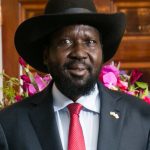Politics
South Sudan Politics
This page explores South Sudan’s political structure incorporating real-time RSS feed news and videos. By harnessing the power of RSS feeds, visitors can stay informed about the latest developments in South Sudan’s politics as they happen. The dynamic nature of these feeds ensures that users receive up-to-the-minute updates on political events, policy changes, and significant milestones, enabling them to stay abreast of the ever-evolving political scene.

Salva Kiir Mayardit
1st President of South Sudan
Incumbent
Assumed office
9 July 2011
Image credit
South Sudan, the youngest country in the world, gained independence from Sudan in 2011. However, since its independence, South Sudan has faced numerous political and humanitarian challenges. The country’s political landscape is marked by a fragile governance structure, internal conflicts, and the need for peacebuilding and nation-building.
South Sudan’s political system is a presidential republic, where the President of the Republic holds executive power. However, political stability has been elusive, and power struggles among political elites have contributed to ongoing conflicts. The country has experienced internal violence and ethnic tensions, particularly between the Dinka and Nuer ethnic groups, leading to displacement, loss of lives, and humanitarian crises.
The Comprehensive Peace Agreement (CPA) signed in 2005 laid the foundation for South Sudan’s independence, but the country faced renewed conflict in 2013 when political disagreements between President Salva Kiir and his former deputy, Riek Machar, escalated into a violent confrontation. Subsequent peace agreements have been signed, most notably the Revitalized Agreement on the Resolution of the Conflict in South Sudan (R-ARCSS) in 2018, aiming to restore stability and facilitate a political transition.
The challenges in South Sudan go beyond political conflicts. The country faces significant humanitarian issues, including food insecurity, displacement, and limited access to basic services such as healthcare and education. The international community has been actively engaged in supporting peace efforts, providing humanitarian aid, and helping rebuild state institutions.
The path to sustainable peace and development in South Sudan involves addressing underlying grievances, establishing effective governance, promoting inclusive political participation, and fostering reconciliation among different ethnic groups. Building strong institutions, implementing the peace agreements, and ensuring accountability for human rights abuses are essential for creating a stable and prosperous South Sudan. The future of South Sudan depends on its ability to overcome political divisions, build strong institutions, and prioritize the well-being of its people. Continued international support and engagement will play a crucial role in assisting South Sudan in its journey toward lasting peace, development, and nation-building.
Unless other sources are listed, original content is provided by ChatGPT. ChatGPT may produce inaccurate information about people, places, or facts. #SouthSudan #SouthSudanPolitics #SouthSudanNews #SouthSudanNewsToday #SouthSudanRSSFeed #BlahFace



